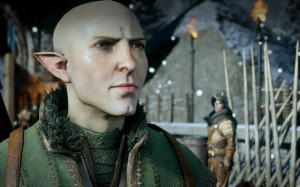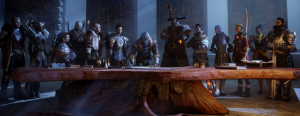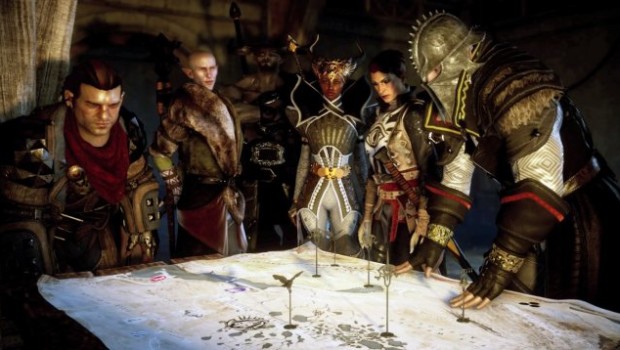Dragon Age: Inquisition: Performance Review
Dragon Age: Inquisition could have been the closest gaming’s ever come to dramatizing the life of a corporate general manager. A person smack dab in the middle of the bureaucratic pyramid, where questions and decisions pertain almost exclusively to the organization and management of people, not budgets and markets.
That’s not a joke: As the Inquisitor, you have a staff of direct reports, who have nameless reports of their own. For a while, you have peers. You have a budget, a little R&D, and ongoing expenses. You don’t decide any real strategy, but you do have a vision and a set of clear goals. “Close the breach!” says executive management. “Shareholders demand fewer rifts and more Elfroot!” Your job is to cultivate relationships that get results from the sword-hefting and spell-casting cogs in your department.
 With this setup in place, BioWare quietly shows you how to be terrible at your job–and hilariously, doesn’t punish you for it. In Dragon Age: Inquisition, you’re a scumbag. I mean: you’re the reason HR departments exist. (Hell, I promoted my HR adjunct, Leliana, just because she didn’t ride my case. I felt I had to force the game to make SOME nod to management realities.)
With this setup in place, BioWare quietly shows you how to be terrible at your job–and hilariously, doesn’t punish you for it. In Dragon Age: Inquisition, you’re a scumbag. I mean: you’re the reason HR departments exist. (Hell, I promoted my HR adjunct, Leliana, just because she didn’t ride my case. I felt I had to force the game to make SOME nod to management realities.)
Your first strike is hitting on your employees without consequence. By and large, all sexual advances are initiated by you, the boss. You are blissfully unaware of the power inequality. It’s okay; the game doesn’t ask you to worry. You have the loyalty and command of the finest soldiers, spies, and functionaries of two major nations, and a few from outlier lands as well. You sit atop a fragile Jenga tower of employee trust. And if you bang them? The game only rewards you for it.
 Or you play favorites. You neglect folks in critical roles and lavish rewards on your friends. I went through the whole game never talking to Leliana or Cullen more than once–they even remarked on it, so the game has mechanical awareness–and yet, there were no actual repercussions.
Or you play favorites. You neglect folks in critical roles and lavish rewards on your friends. I went through the whole game never talking to Leliana or Cullen more than once–they even remarked on it, so the game has mechanical awareness–and yet, there were no actual repercussions.
Think about it: how did you assemble your team? Did you pick Cassandra because she’s great at her job and provides astute, self-aware counsel? Or because you have a thing for short-haired, self-doubting white girls? What about Dorian, who makes team meetings a hoot but spends every other week causing an HR debacle? Did you see Josephine’s vulnerability as an opportunity to mentor her–or to seduce her? Oh, and Vivienne’s off-limits for any romance; is that why she was also off-limits to your party?
In the Inquisition, none of these attitudes and behaviors are destructive. They’re not even considered gross! And let’s be clear: given the context, they really are gross. This isn’t a little band of heroes you’re being asked to nominally spearhead, à la most RPGs; you’ve been vested as the General Manager of a whole Chantry spinoff. You make the tough decisions. You procure resources. Prosecute failures. Who’s on the A-team? The B-team? Who gets the new gear? Who gets promoted? That’s all up to you. It’s the narrative framework of the entire experience!
 In the Real World, the only way to be a halfway decent manager is to be professional. And yet the game discourages this at every opportunity. I went through the whole game maintaining a professional distance from everyone–it’s what I’m trained to do when running a shop floor–and I didn’t even get a “World’s Best Boss” mug from Varric, or a passive-aggressive manager feedback note from Cassandra. I almost elf-dallied with Solas–hey, I was really curious about the secrets of the Fade–but I didn’t, as that decision would be disastrous anywhere the personal actions of a single human being can topple an entire power structure. I guess we coulda hooked up without any drama. And nobody cared I gave Varric all the best gear, just for being funny. (Okay, I dropped the ball there.)
In the Real World, the only way to be a halfway decent manager is to be professional. And yet the game discourages this at every opportunity. I went through the whole game maintaining a professional distance from everyone–it’s what I’m trained to do when running a shop floor–and I didn’t even get a “World’s Best Boss” mug from Varric, or a passive-aggressive manager feedback note from Cassandra. I almost elf-dallied with Solas–hey, I was really curious about the secrets of the Fade–but I didn’t, as that decision would be disastrous anywhere the personal actions of a single human being can topple an entire power structure. I guess we coulda hooked up without any drama. And nobody cared I gave Varric all the best gear, just for being funny. (Okay, I dropped the ball there.)
To me, the career people manager, this is utterly absurd. Imagine firing up a modern war game and finding that there’s no notion of supply lines. Or, more aptly, perhaps the text talks about supply lines, but you find your tanks and jets run flawlessly as long as you spend a turn or two washing them before the skirmishes and complementing their sleek shine.
 If these objections seem silly, you might not be ready to manage an organization. BioWare encourages and rewards you as a leader by for making it completely personal, in complete contradiction to volumes upon volumes of Harvard Business Review literature on the subject. At no point does the game punish you for sleeping around, playing favorites (“Hey! Who’s up for a trip to the Coast? Oh, sorry, Blackwall, you’re too old.”), or just plain acting unprofessionally. Ironically, you can suffer attrition if you don’t directly pander to the narrow needs of your go-to guys and gals, which is also not a good look for a high-level leader. Like I said, this game wants you to make leadership deeply personal with your favorites.
If these objections seem silly, you might not be ready to manage an organization. BioWare encourages and rewards you as a leader by for making it completely personal, in complete contradiction to volumes upon volumes of Harvard Business Review literature on the subject. At no point does the game punish you for sleeping around, playing favorites (“Hey! Who’s up for a trip to the Coast? Oh, sorry, Blackwall, you’re too old.”), or just plain acting unprofessionally. Ironically, you can suffer attrition if you don’t directly pander to the narrow needs of your go-to guys and gals, which is also not a good look for a high-level leader. Like I said, this game wants you to make leadership deeply personal with your favorites.
Mix that chummy attitude with BioWare’s silly “relationship sim” framework and you have a recipe for something culturally ugly. The abuse of power structures for sexual harassment is a practice as old as tales of knights and dragons. And while it may not immediately spring to mind for most gamers, the fact that Dragon Age: Inquisition tacitly reinforces the worst traits of the worst managers–the lack of awareness of power inequalities; the dangers of favoritism and nepotism; the tragedies of workplace romances; pandering in general–is pretty sad, although I don’t know if I should blame the naïfs at BioWare as much as I should our collective cultural cowardice around the abuse of power for sex and validation.
 That’s not to say the game is bad, or that you the player are bad because you got busy with Iron Bull in a Chantry alcove. Most games drop the ball when their scenarios touch upon life experiences of which the creators are wholly ignorant. My biggest gripe is about wasted opportunity: the game misses a chance to offer a very relevant and powerful teachable moment.
That’s not to say the game is bad, or that you the player are bad because you got busy with Iron Bull in a Chantry alcove. Most games drop the ball when their scenarios touch upon life experiences of which the creators are wholly ignorant. My biggest gripe is about wasted opportunity: the game misses a chance to offer a very relevant and powerful teachable moment.
What if the Inquisition failed because you couldn’t keep your paws off Cullen? What if you ruined everything that’s good in Ferelden because you took Dorian’s flirtations too far? What if Cassandra, unable to look you in the eye again after you pressured her into a fling, filed a formal complaint with Leliana, and left the Inquisition–and then Leliana handed in her papers, too? What if Solas decided to wage a jealous campaign against you, selling all his knowledge of the Fade to the competition, just to get his revenge?
 Does any of that sound goofy to you? Because I’ve seen departments, even entire corporations, brought low because one leader couldn’t keep above his or her own base instincts. It’s not just about the lawsuits or the public dog-and-pony show whenever a bigwig blows up. It’s about the massive breakdown in trust and communication that happens when a leader engages in anything from predatory sexuality to passive nepotism–two behaviors that Inquisition actively encourages.
Does any of that sound goofy to you? Because I’ve seen departments, even entire corporations, brought low because one leader couldn’t keep above his or her own base instincts. It’s not just about the lawsuits or the public dog-and-pony show whenever a bigwig blows up. It’s about the massive breakdown in trust and communication that happens when a leader engages in anything from predatory sexuality to passive nepotism–two behaviors that Inquisition actively encourages.
How poignant would it be to have a game where you stood on the cusp of greatness, only to lose the world because you couldn’t put your own urges and needs aside for the greater good–to place trust and professional community over personal love and friendship? How many players would have lost because they were so excited to have a virtual relationship or build out a regular party of overpowered besties? It would’ve been an amusing troll, for sure.
 We fetishize a certain level of reality in our games, even the ones that involve dragons and wizards. The only reason Inquisition doesn’t drop your disbelief forty stories into a parking lot is because most gamers haven’t spent time as people managers–or been the victim of an unequal power relationship. Dragon Age: Inquisition never specifically set out to be a management simulation. But it sure does a bang up job of reinforcing the worst notions people bring to management: that the gig exists to flatter the leader and provide opportunities for extraordinary personal indulgence–and that there’s nothing but glory for the narcissist.
We fetishize a certain level of reality in our games, even the ones that involve dragons and wizards. The only reason Inquisition doesn’t drop your disbelief forty stories into a parking lot is because most gamers haven’t spent time as people managers–or been the victim of an unequal power relationship. Dragon Age: Inquisition never specifically set out to be a management simulation. But it sure does a bang up job of reinforcing the worst notions people bring to management: that the gig exists to flatter the leader and provide opportunities for extraordinary personal indulgence–and that there’s nothing but glory for the narcissist.
Trust me, there’s no great accomplishment in being the world’s shittiest boss, though you wouldn’t know it from on Dragon Age: Inquisition. It’s a shame that what could have been an interesting exploration of power dynamics and interpersonal relationships in a high-pressure, results-focused scenario turned out to be just another power fantasy.










